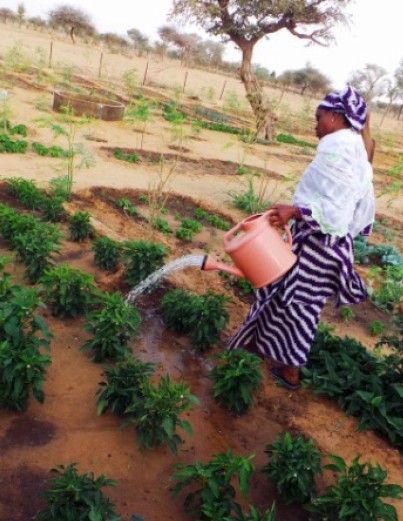Speeches Shim

Niger experiences low and variable rainfalls, land degradation, deforestation and desertification. The vast majority of Nigerians depend on agriculture for their livelihoods, and frequent droughts in the region often damage crop yields, leading to food shortages in the country. Chronic food insecurity and a high prevalence of infectious diseases have led Niger to record some of the highest malnutrition and mortality rates in the world. According to United Nations estimates, nearly 3.4 million Nigeriens are chronically food insecure. More than 40 percent of children under 5 years of age suffer from chronic malnutrition and acute malnutrition rates regularly exceed the World Health Organization’s threshold of serious concern of ten percent.
AGRICULTURE
Agriculture and Food Security Goals
Increased representation of women in food and nutrition issues in the community
Developed nutrition-sensitive practices
Increased agricultural production and productivity
Ensured appropriate natural resource management, including land tenure
USAID is supporting Niger’s agriculture sector with resources focused on improving the agricultural livelihoods of the most vulnerable populations. Under the Resilience in the Sahel Enhanced (RISE) initiative and other regional programming, USAID activities focus on improving access to credit, diversifying economic opportunities, and improving natural resource and soil management to foster better agricultural and animal production with the use of legally recognized land use plans. In addition, USAID is working to improve the competitiveness and inclusiveness of three pro-poor value chains: cowpea, small ruminants, and poultry, while strengthening the organizational capacities of farmer groups.
FOOD SECURITY
USAID is reducing food insecurity through a combination of emergency humanitarian and development assistance. Food for Peace (FFP) and the Office of U.S. Foreign Disaster Assistance (OFDA) humanitarian initiatives, in collaboration with other development activities under the RISE initiative, comprise the key elements of the food security program in Niger. RISE uses a multi-sectoral approach to address the diverse and structural causes of chronic vulnerability by increasing sustainable livelihoods and improving health and nutrition. The RISE initiative aims to reduce food insecurity and malnutrition in rural households through activities focused on health, nutrition, water and sanitation.

Comment
Make a general inquiry or suggest an improvement.